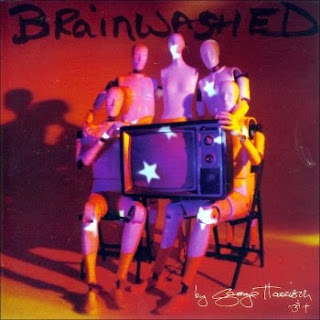

I was talking to the professor the other day- you know who, the swing-influenced guitar player in our erstwhile band Rented House- about the merits of song-craft while listening to Paul McCartney’s Chaos and Creation in the Backyard. It was a lovely rainy afternoon, and I’d just played the entirety of George Harrison’s excellent posthumous album Brainwashed. The Prof was of the opinion that though he likes the songs on both these albums, he reckons that the playing on the latter was better. Also that the standard major key-minor key formulas that McCartney employs so well in his pop songwriting were a bit same-y. Harrison’s songcraft, meanwhile, is that much more painstaking, with interesting shifts and solos.
My contention was that though admittedly Harrison’s songs and playing was beautiful, his album suffered because of Jeff Lynne’s very 80’s production, polishing the songs till they gleamed. McCartney’s album, is a much quieter affair, downbeat in tone and music, and expertly “put together”, was a more consistent one. From this talk turned to the music that the Beatles made, and the Prof opined that though their music is undeniable, their musical chops never matched up to their ambitious musical ideas. I think they didn’t feel the need to, given the fact that they had three great singers and that their songs were put together for the radio, where solos come a distant second to getting consistent melodic hooks across that wedge into your skull and refuse to let go. Their wry lyrical maturity helped too of course, which is the reason that they their oeuvre probably contains 70 great songs, as opposed to, say, the Stones’ 30. The Prof would give either band lot less classics, and I understand that.
To me, however, the Stones were a great groove band, and when they connected, they were irresistible. The Beatles’ music is a more complex affair- carefully constructed little potboilers which cherry-picked a wide gamut of musical ideas- from Motown (Drive My Car) to Country (I’ve Just Seen a Face) to Tin Pan Alley (And I Love Her) to Swing (Honey Pie)- without ever really mastering any one form. Instead their takes on these and other genres bordered on the pastiche favoured by Music Hall performers- showmen who could play anything for laughs. That is what makes them such pop geniuses I think, though admittedly if they had chosen any one of these forms to develop in their music, they’d be a different band, with good musical chops and solos. Harrison probably came closest to this, adopting the slide guitar, educating his ears to Eastern musical modes and thereby increasing his musical range. Whenever he emerged from his self-imposed exile to record music, as he did with Brainwashed, he sounded beautiful, fragile and not as irritatingly self assured as many of McCartney’s lesser works.
The Stones pioneered boogie-heavy blues rock, and as they grew more and more fascinated with Americana, they stretched out in other directions- Country (Sweet Virginia), Gospel (Gimme Shelter)- but essentially remained a Chuck Berry-influenced riff-based rock band, and after four great albums, they were bound to run out of steam and ideas.
No comments:
Post a Comment